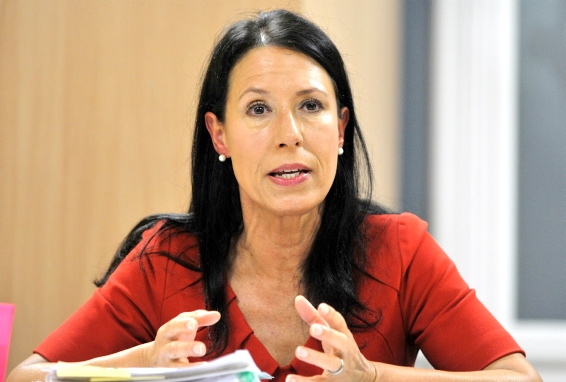British MP who chairs J&K Comtt.’ treated like criminal and deported’ at India airport
 NEW DELHI : A British MP has been refused entry to India after she voiced criticism of the Indian government’s policies in the disputed Kashmir region.
NEW DELHI : A British MP has been refused entry to India after she voiced criticism of the Indian government’s policies in the disputed Kashmir region.
Debbie Abrahams, the Labour MP for Oldham and chair of a parliamentary committee on Kashmir, arrived at Delhi’s international airport shortly before 9am on Monday, but was stopped at immigration and told her e-Visa was no longer valid.
Labour Party MP Debbie Abrahams claim that she had a valid visa was rebutted by India’s Home ministry which said she was informed about her e-visa being cancelled. Abrahams, who chairs the All Party Parliamentary Group for Kashmir, said she was travelling on a valid e-visa to India to visit family and friends but her visa was revoked without explanation.
A Home Ministry spokesperson in New Delhi said the British parliamentarian had been duly informed that her visa was cancelled and she arrived in Delhi despite knowing this. When contacted, Abrahams told PTI she “had not received any emails before February 13”. After that, she had been travelling and was away from office.
Ms Abrahams said when she landed around 8.50 this morning, she was told by Delhi airport officials that the e-visa issued last October and valid until October 2020 had been rejected.
“Along with everyone else, I presented myself at the immigration desk with my documents including my e-visa, had my photograph taken and then the official looked at his screen and started shaking his head. Then he told me my visa was rejected, took my passport and disappeared for about 10 minutes. When he came back he was very rude and aggressive, shouting at me to ‘come with me’,” said the British MP in a statement.
“I told him not to speak to me like that and was then taken to a cordoned off area marked as a Deportee Cell. He then ordered me to sit down and I refused. I didn’t know what they might do or where else they may take me, so I wanted people to see me.”
The politician said she rang a relative she was to stay with, and he called the British High Commission to try and find out what was going on. She also said she asked about a visa on arrival, but got no answers.
Ms Abrahams plans to stay overnight in Dubai before flying on to Islamabad on Tuesday, saying she would not let the episode with India affect her plans to visit Pakistan.
India moved in August last year to revoke its portion of Kashmir’s special constitutional status and autonomy, as well as its position as a state, and blocked internet access in a crackdown that, in some parts of the valley, remains in place to this day.
The 59-year-old Ms Abrahams, who was due to visit friends and family in Delhi for two days before flying on to take part in a formal delegation to Pakistan-administered Kashmir, said she believed she was blacklisted over the fact she had “expressed concerns” about the Modi administration’s actions, as well as her onward travel plans.
“I can’t see it not being connected,” she said. Ms Abrahams travelled to India with an e-Visa that permitted her to “attend technical/business meetings”, and was due to expire in October 2020.
During the hours she spent blocked at Delhi airport she was told “not one word” about why she was being refused entry. She said the immigration official who first denied her entry was “rude and aggressive and treated me like a criminal”, but that the many other officials she dealt with had been “very polite and courteous”.
According to government source Ms Abrahams “was not in possession of a valid visa to visit India”, adding that “entry into the country was therefore denied”.
Ms Abrahams tweeted about her situation while waiting in a room marked as a “deportee cell”, and was met by a large number of critical or abusive replies, purportedly from Indian accounts, saying they were “glad” she was refused entry, calling her a “terrorist sympathiser” and suggesting she could have been “put in prison or shot on sight”.
She defended speaking out about the situation in Kashmir, saying “I think human rights should be the focus of the All Party [Parliamentary] Group [on Kashmir]. We are signatories of the UN Convention on Human Rights and it is every state’s obligation, when we see issues that we are concerned about affecting different populations in a state, that we have to speak out.”
The Indian government is highly sensitive about international criticism of its actions in Kashmir, and in a separate incident on Monday summoned the Turkish ambassador to Delhi over President Tayyip Erdogan’s remarks on the disputed region.
Nobel laureates demand Gates Foundation withdraw Modi award During a visit to Pakistan last week, Mr Erdogan said the situation in Indian-administered Kashmir was worsening because of the sweeping changes introduced last August, and that Turkey stood in solidarity with the people of Kashmir.
Meanwhile, Foreign ministry spokesman Raveesh Kumar said Mr Erdogan’s comment was “but one more example of a pattern of Turkey interfering in the internal affairs of other countries”. “India finds that completely unacceptable,” he said, adding the episode would “have strong implications for our bilateral relationship”.
It all comes just a day after India lashed out at the UN Secretary General, Antonio Guterres, for offering his own mediation as part of “enhanced dialogue” between Pakistan and India over Kashmir. Both countries administer a portion of the region and claim it in its entirety.
(With Agency Inputs ).

